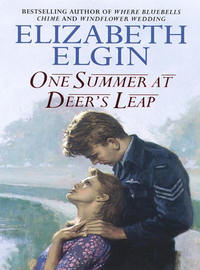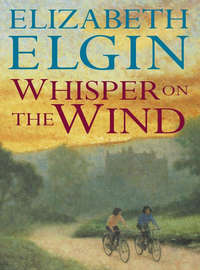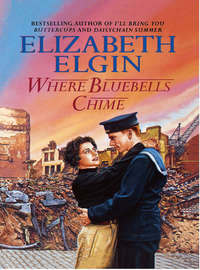
Полная версия
Daisychain Summer
‘Please – something we have done wrongly?’ The countess challenged her caller’s inquisitive, roaming eyes.
‘N-no. Foolish of me, but I had expected a samovar. And your furniture …’ she faltered.
‘You expected us to be very Russian? You thought to see oriental carpets, silk hangings and rare paintings? And it surprises you that I use so English a teapot?’
‘I didn’t know what to expect,’ Clementina said with complete candour. ‘I had thought that –’
‘That you would have wealthy people living next to you? Then you are much to be disappointed. Our homes – the winter town house and the one in the country we used each summer, are gone. We could not bring them with us, nor our estates and possessions. To arrive here with our lives was itself a miracle, thanks be to Our Blessed Lady.’ She crossed herself and nodded to the – what was it? Clementina frowned. Some sort of religious picture?
‘A holy icon,’ supplied the countess. ‘Once, it hung over my bed. Always, in summer, we left Petersburg for the country – so much cooler. And when we heard of the trouble in the city, we stayed there, even though winter was near – Anna and I, that was …
‘My husband and our sons returned to Petersburg at once – the mobs were looting, we were told. They got out what valuables they could from the town house and left them with me in the country – until the revolutionaries were defeated and it was safe for us to go back. But they were not defeated. We dare not return to Petersburg.’ She passed a cup with hands that shook.
‘And then?’ Clementina breathed.
‘Igor stayed behind to take care of Anna and me. My husband and elder son returned to St Petersburg to do what they could. Basil and Igor were in the army during the war, at the Military Academy. They were too young to be sent to the Eastern Front – Basil might have lived, had he been there.’
‘And your younger son? Why did you not insist he left Russia with you?’
‘Because he is a man – or almost a man – and his Czar needed him. Besides, there were – things – still to be found; hidden things. Anna and I brought what items of value we could with us – and Our Blessed Lady. It was She got us to safety. I pray to Her each night for Igor’s life – that he may soon find us here. This house – he knows of it …’ She stopped, abruptly, breathing deeply, lifting her shoulders, ashamed she had let down her guard before a complete stranger. ‘Do you think it will rain today?’
‘That is very English of you,’ Clementina smiled. ‘And might I say how well you speak our language? I thought –’
‘That I would speak only Russian? I have French, also. Our children had an English governess and spoke only English in the schoolroom. But I am so angry with those Bolsheviks that I took a vow that only English should be spoken – except on saints’ days – until there is a Romanov on the throne once more.’
‘Dear lady – forgive me – but the Czar is dead; his heir, too.’
‘I fear so. But there are Romanovs still alive; the Grand Duke Michael – the Czar’s brother – what has happened to him we do not know. We only know that our Czar, God rest him, was murdered.’ She bowed her head and crossed herself piously. ‘But I speak too much which I ask will not be repeated by you. For the sake of my son, I ask it.’
Once, in the Imperial days, she doubted she would have received any woman without first checking her pedigree most thoroughly. Indeed, in St Petersburg, their circle of acceptable friends had been select and small. Now, even though she was as nothing in a strange country, she should not let her standards drop. It was just, she sighed inside her, that she was lonely and homesick for Russia and afraid, still, that those who had in even the smallest way served the Czar would be hunted down no matter where they might be.
‘Not a word shall pass my lips,’ Clementina breathed, eyes wide, heart bumping.
‘So, Mrs Clementina Sutton of Pendenys – now you shall tell me about your children …’
The countess had, Clementina was to think later, deftly changed the subject and not one more word about her refugee neighbours had she gleaned. Yet the countess had indicated that though in mourning she would return the call, Clementina thought with satisfaction, and meantime she had deduced that the lady was a widow; that her elder son had been killed and that her younger son was somewhere in Russia, still – St Petersburg, perhaps? – looking for things, though what he sought was still a mystery. Nor had she met Anna.
Anna, had her parents’ title been English, would have been Lady Anna, she frowned. In England, of course, a countess would be the wife of an earl and she was as sure as she could be that Russian aristocracy sported no earls. Maybe though, the husband had been a count? She shook her head. It was all very confusing – and there was something else that might well put a different complexion on things. Anna Petrovsky could already be promised!
She removed her costume and placed it carefully on a hanger. It had been a mistake, she admitted; a very expensive mistake and entirely the wrong colour in which to impress someone who must surely detest anything red.
When the countess returned her call she would be more careful and dress more suitably. And when that happened, surely Anna – Lady Anna – would accompany her mother? She did so want to meet her; decide whether she was wasting her time in patronizing the family next door. It might well be, she was forced to admit, that she would have to cast her net wider in her quest for a wife for Elliot, though she hoped not. After all, it was not essential her son’s wife should have money; what she must have, though, was breeding. Breeding such as Helen had. No amount of money would buy it – a fact of life she had learned the painful way – and no amount of poverty could disguise it. But only let the girl next door be in the market for a wealthy husband, she pleaded silently, and the search was over – and Elliot’s womanizing too, did he but know it!
‘Well now, Miss Julia, and what have you come to tell us?’
Cook placed two cushions on the kitchen chair, then perched Drew on top of them. Ever since this morning, when Miss Julia had begged afternoon tea in the kitchen in exchange for some very, very good news, Cook had been on tenterhooks.
‘Like I promised – good news; cherry scone news.’ Julia drew her chair up to the table. ‘And no, Mrs Shaw, Drew may not have all those cakes’. Deftly she removed an iced bun from his plate, returning it to the tin, ‘even though I know you made them especially for him.’
Eyes bright, she waited until cups had been filled and passed round and Mrs Shaw had nodded that tea might begin before she said. ‘It’s about Alice.’
‘She’s well again? Her ladyship is coming home?’ Tilda gasped.
‘Yes – and no. She is very well, but she is no longer her ladyship and she won’t be coming to Rowangarth just yet. She has her very own home, now. That is where I have been – acting godmother to her little baby. Alice has married again …’
‘Oh, my word!’ Cook dropped her knife with a clatter, gazing stunned around the table. At Mary, who’d suspected, hadn’t she, where Miss Julia had been; at Tilda’s bright pink cheeks and at Jinny Dobb, whom Julia had said should be asked. There was no pleased surprise on Jin’s face, Cook thought. Jin, the sly old thing, merely looked – sly. Her face was without emotion – if you could ignore the I-know-something-you-don’t-know look in her pale blue eyes, that was. ‘Married?’
‘A year last July, Mrs Shaw.’
‘So when she left …?’ At last, Mary found her voice.
‘When she left us she wasn’t going to Aunt Sutton. I’m sorry if you were deceived, but Alice felt that people she knew and cared for might not take too kindly to her leaving her little boy behind.’
‘But she did leave him behind, for all that!’ Tilda Tewk had a way of putting things that was rarely the embodiment of tact.
‘Yes, but not for the reason you might think. Alice had a choice – and she made it!’
Julia took a deep breath. This was not as easy as she had thought. Miss Clitherow had taken the news calmly; below stairs, it would seem, they had not the same control of their curiosity – nor their emotions.
‘You mean, she had the choice between this little lad, here, and – and …’
‘And should we be talking like this in front of him?’ Mary whispered, sliding her eyes to the small boy.
‘It’s all right. He doesn’t understand. The cherry on his bun is of far more interest to him, at the moment,’ Julia smiled. ‘And Alice wasn’t an uncaring mother. She put Drew’s interests first; best he should grow up with his inheritance, she felt, and mother and I agreed with her.’
‘But where did she go, if it wasn’t to Miss Sutton?’ Tilda demanded. ‘Was it to him – the man she’s married to?’
‘To him,’ Julia said softly. ‘We wanted her to, once we knew he was not –’
‘Dead?’ For the first time, Jinny Dobb spoke. ‘That Tom Dwerryhouse hadn’t been killed, after all?’
‘That Tom was alive,’ Julia nodded. ‘The Army thought him dead, but he’d been taken prisoner.’ The lie slipped out easily.
‘And them Germans had locked him up and never told no one about it?’ Cook choked.
‘It happened a lot.’ All at once Julia felt relief that the news was to be accepted with no more than a modicum of surprise. ‘When it happened, things were in a turmoil at the Front. The Germans and Austrians were getting the better of us and things were in a bad way. No news of any kind was getting through. But how did you guess, Jin? Did you see it in the bottom of your teacup?’
‘Something like that, Miss.’ Slowly, she smiled.
‘But married …’ Cook took her apron corners, ballooning it out, ready to weep into it as she always did, when overcome.
‘And a mother,’ Tilda gasped, her romantic heart thumping deliciously. ‘What did she have, Miss Julia?’
‘A little girl. Daisy Julia Dwerryhouse. She’s very beautiful. I took my camera with me. As soon as the reel has been developed, you shall see Alice and Daisy – and Tom.’
‘Then she’s had two beautiful bairns,’ Cook pronounced, taking another bun from the tin, placing it defiantly on Drew’s plate. ‘And this lovely little lad here has a sister!’
‘A half-sister. Alice asked especially that I should tell you all about her remarriage. I hope you’ll all be happy for her. Mother and I are. We are hoping she will come and stay with us as soon as Daisy can make the journey.’
There, now! She had done it! Not only had she broken the news about Tom, but she had also let it be known that the Suttons – the Rowangarth Suttons, that was – were delighted about it. How the Pendenys Suttons would react to the news remained to be seen. To Nathan, it would come as no shock at all; to Elliot, it might have entirely different repercussions.
Determinedly, she pushed Pendenys to the back of her mind. Drew was Giles’s son; was even Sutton-fair, even though Elliot was dark as a gypsy.
‘Where is she, Miss?’ Tilda’s voice broke into her broodings. ‘I want to write – tell her how pleased I am.’
‘Alice would like that. I know she misses you all. She’s in Hampshire, but I’ll write down her address for you. And might I have another scone, Mrs Shaw? There is no one can bake cherry specials like you!’
Cook obliged, beaming, spreading the butter thickly. ‘But oh, my word; Alice Hawthorn wed and to her Tom, and a little babbie an’ all!’
‘It’s like a story in a love book, isn’t it?’ Tilda breathed. ‘One with a happy ending …’ Tilda, who read every love story ever published, was an authority on happy endings. ‘I’ll write to Alice tonight.’
‘Us all will,’ Cook nodded. ‘And send a present for her little lass.’
‘Good. Well, best be off!’ Julia made to lift Drew into her arms, but Cook was quick to ask,
‘Leave him with us, Miss Julia? He does so enjoy playing with my button box. Just like Sir Giles did …’
‘Very well. But make sure he doesn’t put buttons in his mouth, and don’t dare,’ Julia gazed pointedly at the cake tin, ‘give him another iced bun – not even if he says pretty-please for it!’
‘And I’d best be getting back to the bothy.’ Jin rose to her feet. ‘Thank you kindly for having me, Mrs Shaw,’ she murmured, following Julia out.
‘You knew, Jin Dobb.’ Julia closed the kitchen door behind her. ‘Alice told me you knew about Tom right from the start, yet you never breathed a word – not even to me. How ever did you manage to do it?’
‘Easy, Miss Julia. For one thing, I promised Alice I’d never tell I’d seen him, and for another – well, scrubbing woman in the bothy I may be, but it was nice, all them months, knowing summat that lot in the kitchen didn’t know! And Miss – it was a sin and a shame there couldn’t have been another come back from the dead …’
‘It wasn’t to be, Jin. And I’ve got Drew.’ She took a long, unsteady breath. ‘Alice left me the child …’
‘That she did. And take heart, Miss. I saw happiness in Alice’s hand and there’s happiness to come for you, an’ all. I know it.’
‘How can you know, Jinny Dobb?’ Julia’s words were harsh with bitterness. ‘You’ve never read my hand.’
‘No more have I. But it’s all around you, like a glow. No one can see it but Jin, and Jin Dobb isn’t often wrong!’
‘It isn’t possible. I couldn’t. Not again!’ She didn’t want to be happy with any man but Andrew.
‘Not love again? With respect, Miss, there’s first love and there’s last love and love of all shapes and sizes in between, so don’t shut your heart to it, when you chance on it …’
‘But I won’t chance on it, so don’t ever say such a thing again!’
‘I won’t.’ She’d said what she had to say – now let it rest.
But Miss Julia would encounter love – when her heart was good and ready, that was; oh my word, yes! What she would make of it might be altogether another thing, but love again she would. One day …
5
Clementina Sutton had fretted and fumed alternately for the remainder of the week. How much longer she could remain in the London house waiting for the countess to return her call, she did not know. And when was she to meet Anna Petrovska? Clearly, something must be done, yet etiquette decreed she could not call again at the house next door. Correct behaviour demanded that she must now await a return visit and as yet the silly woman hadn’t even left her calling card!
How long before she must return to Pendenys? How long dare she leave Elliot alone, virtually, with no one to pull on the reins when he became bored and restless and decided to take himself off in search of pleasure!
His father didn’t care. Edward disliked his eldest son with undisguised feeling and avoided the poor boy like the plague. Trouble was, she brooded, Pendenys Place was so vast that avoidance came easily. So many rooms, inner doors, outer doors, unexpected staircases. People could go for days without meeting, if they were set on it.
It was then she had jumped moodily to her feet, lifted the lace curtain that covered the window and saw, oh, thanks be! a young woman in the garden next door who could only be Anna Petrovska.
At once she felt relief she’d had the good sense to have the fence removed; the fence she caused to be built – with good reason, mind! – when it seemed certain the people next door might be European refugees, common soldiers or gypsies.
In less than a minute she was standing at the garden wall, smiling a welcome over it, whispering, ‘Good morning, my dear – you must be Anna. I have heard so much about you.’
‘Good morning, ma’am. Are you the lady who called on Mama – Mrs Sutton of Pendenys? I am so pleased to meet you.’
She extended a delicate hand. ‘Aleksandrina Anastasia Petrovska,’ she smiled. ‘Anna …’
‘You have a very beautiful name.’ Genteelly Clementina touched her fingertips.
‘Ah, yes, but so long. I decided when I was a little girl that my birth-name was too awful to have to print out, so I insisted I became Anna. Vassily and Igor had short names – it was most unfair!’
The corners of her mouth lifted in an enchanting smile to show white, even teeth. She was, Clementina was bound to admit, not only aristocratic but beautiful and if Elliot didn’t think so, she would box his ears!
‘You have the same name as the poor little Grand Duchess,’ she murmured for want of something better to say.
‘Ah – the dear Anastasia, God rest her.’ Exactly as her mother had done, she crossed herself, head bowed. ‘She and I share the same natal day – birthday. I was called in her honour. We were, Mama assures me, born only two hours apart.’
‘Are you Roman?’ Clementina had to ask it, even though it was as wrong to enquire about a person’s religion as it was to ask the extent of their bank balance. ‘A Catholic?’ Well – all that crossing themselves …
‘I am Orthodox – Russian Orthodox …’
‘And is that Christian?’ Clementina sensed difficulties.
‘Yes, of course!’ She laughed with delight. ‘We are as devoutly Christian as the English, only we worship a little differently.’
‘Aaah.’ Clementina’s relief was heartfelt. ‘You mentioned Vassily and Igor. I thought –’
‘Vassily is Basil. I forget we speak only English, now, by command of Mama, though today they talk away in our own tongue – twenty to the dozen, is it you say?’
‘Then today is a saint’s day?’
‘No. Far, far better. Last evening my brother returned safely to England and we all laughed and cried and hugged and kissed. Mama is so happy.’
‘He’s back? Then be sure to tell the countess how very glad I am.’
‘I think you may tell her yourself. She intends to call on you tomorrow or the next day, she said, and give you her good news. You will not spoil it for her? You will be suitably surprised – yes?’
‘Not one word will I breathe,’ she beamed, happy beyond words. ‘And when she calls, might I hope you will be with her?’
‘I shall visit, I thank you. Now, you see, I am permitted to take off my black clothes, though Mama still wears her mourning – for Vassily and Papa, of course …’
‘I shall look forward to your coming. Is your brother well? Were things bad for him, in St Petersburg – oh, your mother told me about it, never fear,’ she hastened to add.
‘He came back safely – and successfully – though doubtless you will hear of it, soon. But Igor is safe, now, and we will try to start living again!’
‘Of course you will! And you, my dear – you’ll be getting married?’ Clementina hesitated. ‘When the countess is out of mourning, that is …’
‘I fear not.’ All at once, the dark eyes were sad. ‘My marriage money, now, is much diminished – and besides, no one has spoken for me though Mama says I am old enough.’
‘And how old would that be?’
‘Nineteen – soon …’
‘Then you must hope. You are very beautiful and that will more than compensate for your dowry. The solution is simple. You must insist upon a wealthy husband! Forgive me, I beg you, for saying so on such a short acquaintance.’ A husband like Elliot, perhaps? All at once, Clementina decided that no other but Anna Petrovska would do. She was the answer to all her prayers. The girl had beauty and breeding and was not so well-heeled, it would seem, that she could afford to be over choosy. And she, Clementina, had the brass. She had a money tree grown tall and thick from a seed planted by Mary Anne Pendennis! ‘And I do so hope I may have the pleasure of receiving you, very soon.’
Clementina knew when to end a conversation. She smiled a goodbye, stumbling in her eagerness to get to the telephone and call Pendenys Place.
‘Edward!’ she gasped when finally her husband lifted the phone. ‘Tomorrow! I won’t be home! I must stay here a few more days!’
‘What is it, Clemmy? You sound quite upset. Has something happened?’
‘Happened? Everything has happened! Oh, I do believe things are working out, at last!’
‘Are you all right?’ Working out? What bee had she got in her bonnet, now?
‘I am perfectly all right! Will you tell Elliot to telephone me back – at once!’
‘I’m afraid he’s in York – a visit to his tailor.’
‘Damn! Well, the very minute he gets back, tell him to get himself down here! Train or motor – I don’t care which. But I want him at Cheyne Walk by ten in the morning – and no prevaricating!’
‘But what if he has other plans?’
‘Then he’d best cancel them. And if he starts making excuses, just say, “Allowance” to him! Now don’t forget, Edward. Ten o’clock tomorrow! Perhaps it’s best he should get the overnight train. Either way, I want him here!’
Edward Sutton was given time to ask no more; the click of the receiver put paid to that. But no matter, he shrugged. He would telephone again tonight when hopefully his wife was calmer.
He reached for the bell-pull. Best order his son’s packing to be done, for Elliot would do as his mother ordered. Any mention of his allowance usually carried the veiled threat of cancellation and commanded instant obedience. It was the only thing, Edward considered with relish, that could bring his wayward firstborn to heel – apart from a good thrashing, that was, and no one yet had dared to give him that. Only the gamekeeper, and that hadn’t been half hard enough, he thought with regret.
He turned his thoughts to his wife. What in heaven’s name was she up to, now?
Tom Dwerryhouse walked the game covers, his dogs at his heels. He had schooled them from brash, bouncy pups to obedient retrievers. They were a fine pair; would work well when the shooting began in October. Until then, it pleased him to see the covers so well stocked with game. This year, Mr Hillier would have the shooting he so looked forward to.
He was a decent employer, Tom conceded, understanding that the keeper had yet to be born who could conjure up instant sport when an estate had been left to neglect over the war years and everything that ran or flew taken by the soldiers to eke out their rations.
He’d had to start from scratch, yet now he had good reason to be satisfied with the young birds in his rearing field. Plump and fine-feathered, they would be turned out before so very much longer to join last year’s rearings.
He squared his shoulders, lifted his chin with pride. Before so very much longer, Windrush shoots would be the talk of the county – he would see to that – and it made him wonder if now wouldn’t be the best time to bring up the matter of an assistant. Soon, the night patrols must start. With the coming of earlier darkness the poachers would be out. Not, Tom accepted, that the one-for-the-pot man was all that much of a nuisance. That kind of poacher took one or two birds only, easily hidden beneath his coat, his need to feed his family far outweighing the risk of being caught and brought before the Magistrates.
It was the organized gangs from the towns a keeper feared; those who took birds by the score. That, Tom said, was greed and not need and the time was not far distant when he would have to talk to Mr Hillier about taking on another man.
He grinned, suddenly, remembering Daisy and the smile she had given him that morning. Her very first smile, and for him! Not wind, Alice assured him solemnly, and before so very much longer they would hear her first chuckle, she had promised.
He was a lucky man. The country was plagued with the Irish troubles, with unemployment and the workhouses full of decent men, tramping the roads begging, almost, for a job; any job. And where were the homes for heroes those fighting men had been promised, once the war was over? What wouldn’t so many of them give for a house such as his? He shivered. Someone had just trailed an icicle the length of his backbone – or was it that someone had just walked over his grave?
It was neither. It was a feeling of sudden alertness; the scent of danger primitive man must have known. It had served Tom well on those forays into No Man’s Land and he had obeyed it without question. He spun round, aiming his shotgun at the bush.







